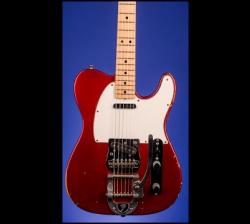I did something no American kid could boast of doing. As a Brit growing up in London in the mid/late 1960s, I saw it all happen.
I saw Eric Clapton and the Yardbirds many times, at places like Klooks Kleek, the Marquee, the Crawdaddy in Richmond, and at the Old Welsh Harp. I grew up with that crowd -- Eric Clapton, Jeff Beck, Jimmy Page -- all of those people!
I'm very fortunate to have lived through that. In England, nearly everybody was in a band. You had to be, even if the band never played anywhere, you practiced in someone's garage or wherever you could.
I was a full-time musician from 1964 to '69, I played Fiesta Red and Sonic Blue Fender P-Basses and then Gibson EB-0s and EB-2s. Sunburst Fenders in those days were more difficult to get than the custom colors; that's the funny thing.
Today, I’m utilizing business skills honed as an antiquarian bookseller for more than 45 years -- my family has traded books since the early 16th century. As a collector of commodities other than guitars, my vision is to push the collector-quality guitar market in a positive way.
Selling books has given me a very good living, especially since I moved to L.A. in 1993. In the rare book business in California, 60 percent of our clientele is entertainment-industry-related. Besides the stars, there are writers, directors, and producers, as well as their lawyers and accountants. They get inspiration from the books they collect. Books illustrate the impact of print on the evolution of Western civilization over the past five and a half centuries.
And much like that market, in California, the classic vintage guitar market is linked to the Hollywood movie recording scene, where musicians use the very best vintage instruments.
In 1996, I started seriously adding to my collection of guitars. I started with 20 and ended up with over 100. In 2004 I opened Fretted Americana with my wife, Caroline, and we have three other people on our team: Dustin Jack, Steve Gertz and our daughter, Debra. We also now have over 200 guitars in our inventory.
There is a significant correlation between vintage guitars and rare books. It's about rising values.
In the rare book business, I've always quoted a 15 percent per annum growth rate. Since 1991, classic vintage guitars have seen an average 24 percent annual growth rate.
That's what motivated me, as a businessman, to go into vintage guitars.
Certainly, the vintage market has morphed since the '70s, when guitar players were simply looking for better guitars. Condition and originality were not as important. But in the latter half of that decade, some dealers started to tout vintage guitars as good investments. Each decade since has brought more insight and scrutiny regarding investment-grade instruments. I’m very aware of the current state of the high end of the vintage market.
With rare books, the very best appreciate better, the poor quality general-material doesn't appreciate at the same rate. The same thing applies to guitars, the run-of-the-mill, mediocre stuff, everybody's got and it's hard to sell. But the great stuff is moving well. And it is a great investment.
In the rare book business, I went for the very best and tried to prove to people that the best appreciates the most. It's the same as any other form of collectible - it can be furniture or art. It's all to do with passion. I only buy what I like, that's what I've always done in the book business. And I never try to sell anything that I wouldn't want to get back: I'm loaning you the book and you're loaning me the money, and eventually if you want to sell the book, you'll sell it back to me.
The same thing applies to my guitar business. It's about building dealer-client relationships.
I want to expand that market by bringing new customers into high-end investment-grade vintage guitars. Fretted Americana's approach is to fully photograph and catalog its inventory. Our descriptions are in-depth, fully describing the guitar and explaining how the guitar evolved.
I'm putting guitars with collectors. My whole idea is to make this business more viable for people who don't even yet know they want to collect guitars."
Still, most collectors are players first, and investors second. And in the early 21st century, guitar investing has risen to a new level and changes in the market are bringing about continuous improvement. My wife and I realize this and we hope that we are good examples of vintage guitar professionals dedicated to pushing the market to greater heights.
David J. Brass

